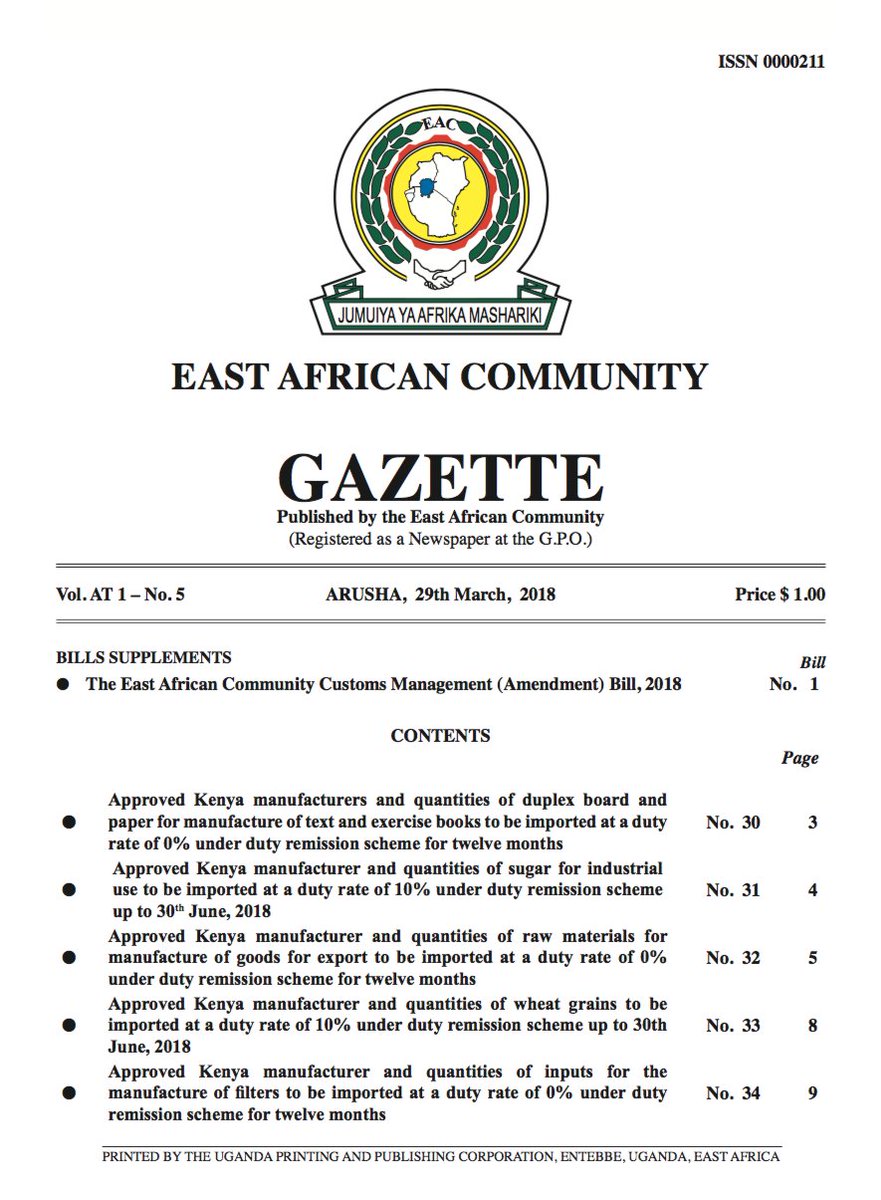EAC Partner States Adopt Import Duty Measures to Boost Local Production Amidst COVID-19 Pandemic EAC Partner States i.e. Burundi, Kenya, Rwanda, Tanzania and Uganda have adopted various measures on EAC Common External Tariff (CET) with the aim of boosting local production in the region. The new import tax changes will be effective in the new fiscal year which commences on 1st July 2020 after being approved during the Pre-Budget Consultations of the Ministers/Cabinet Secretary of Finance that was held via video conference on 13th May 2020.
The EAC Ministers have been holding the Pre-budget Consultations prior to reading the National budgets as a way of harmonizing fiscal measures in the region. The decisions of the Ministers/Cabinet Secretary for Finance on the CET measures were finally endorsed by the meeting of the Sectoral Council on Trade, Industry, Finance and Investment (SCTIFI) on 3rd June 2020 via video conference.
The import duty measures in the EAC Gazette which was issued on 30th June 2020 can be put into three main categories which are Duty Remission for Industrial Inputs, Stays of Application, and Amendments of the East African Community Customs Management Act, 2004. The duty remission measures adopted by the EAC Partner States will ensurethat local manufacturers can import raw materials and inputs which are not available in the region at a lower rate. These duty remission measures are strictly specific for the gazetted manufacturers who have applied for the importation of a specific amount of input/ product at the reduced import duty rate. The Stays of Application measures that are instituted on final products are reported in two scenarios. First, where EAC Partner States agreed to stay application of the EAC CET rate and apply a higher duty rate for the imported products. The second scenario is where EAC Partner States agreed to stay application of the EAC CET rate and apply a lower duty rate for imported products.
The decisions by the EAC Partner States to stay application of the EAC CET rate and apply a higher duty rate are aiming at stimulating local production by safeguarding manufacturing of that particular product against similar cheap imports. Some of the products include textile (garments) and textile products; leather (shoes) and leather products; edible oil; tiles, processed tea; coffee & cocoa; meat & meat products; and steel articles, iron & metal products.
The decision by EAC Partner States to stay application of the EAC CET Rate and apply a lower duty rate was informed by the fact that the region has no sufficient capacity to produce that particular product hence the need to protect East Africans against a higher import duty. This second scenario of stay of application was applied to a few products such as mobile phones, rice in the husk, semi milled or wholly milled rice, sugar, wheat, and barley. Analysis indicates that the existence of the Stays of Application and Country’s Specific Duty Remission in the current EAC Gazette aims at cushioning vulnerable sectors/products, protect local industries as well as enhance local manufacturing and production for those products that the EAC region has the capacity to produce.
Since most of EAC Partner States opted for stay of application of the EAC CET and applied higher duty rates ranging from 35% to 60%, it gives a positive indication that EAC Partner States may soon conclude the comprehensive review of EAC CET as countries have shown some commonalities on the maximum tariff or the level of protection they require. In addition, the ranges of CET measures contained in the EAC Gazette are in line with the EABC Budget Proposals which were submitted to the EAC Secretariat. All EABC customs proposals on duty remission and stay of applications were adopted by EAC Partner States at different degrees/levels.
However, one of the critical challenges arising from the existence of numerous Stays of Application and Country’s Duty Remission is an impediment to the intra-EAC trade as the finished products that benefit from these measures cannot access the regional market at preferential tariff treatment. This is due to the fact that all finished products which benefit from the Country’s Duty Remission once sold in the EAC customs territory shall attract duties, levies and other charges provided in the EAC CET. Furthermore, these measures erode the EAC CET as a uniform policy against imported products into EAC market. To address this critical challenge, EABC urges the EAC Partner States to fast track the finalization of the comprehensive review of the EAC CET so that all countries can uniformly apply the new agreed CET.
The EAC CET is considered as a very important instrument of EAC Customs Protocol as it reflects the trade relations between EAC Partner States and the Rest of the World (RoW) with regards to the import duties charged on imported products into the Community. The implementation of the EAC CET commenced in 2005 after the EAC Customs Union Protocol came into force. The EAC CET is currently structured under three bands of 25% for finished goods, 10% for intermediate goods and 0% for raw materials and capital goods. In addition, there are a limited number of products under the sensitive list that attract rates above the maximum rate of 25% whereby they range from 35% to 100%.
(Attached is EAC Gazette of 30th June 2020 and EABC 2020/2021 BUDGET PROPOSALS)





